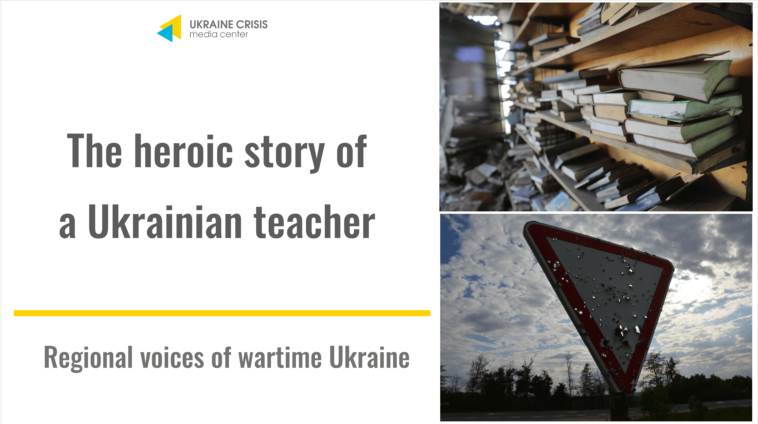In 2022, the Vilkhuvatka community in the Kharkiv region was invaded by Russian troops. Even in such extreme conditions, there were people who openly rejected the occupiers’ offers to cooperate. Moreover, they deliberately did not hide their position, despite all the risks to their lives. Yevhen Novikov, director of the Vilkhuvatka Lyceum, is exactly this kind of person.
“On February 24, we had a terrible wakeup,” Yevhen Novikov said. “We heard explosions, probably at five in the morning. The border outpost was being shelled. It became clear to everyone that the war had broken out. We felt all those fears when we saw a convoy of Russian vehicles. It seemed endless. It was unexpected. We didn’t believe until the last moment. And we weren’t prepared. The TV assured us that nothing would happen. And people believed that everything would be fine. But there was no time to regret anything. We had to think about how to survive and what to do next. In the first two hours, our community was completely occupied.”
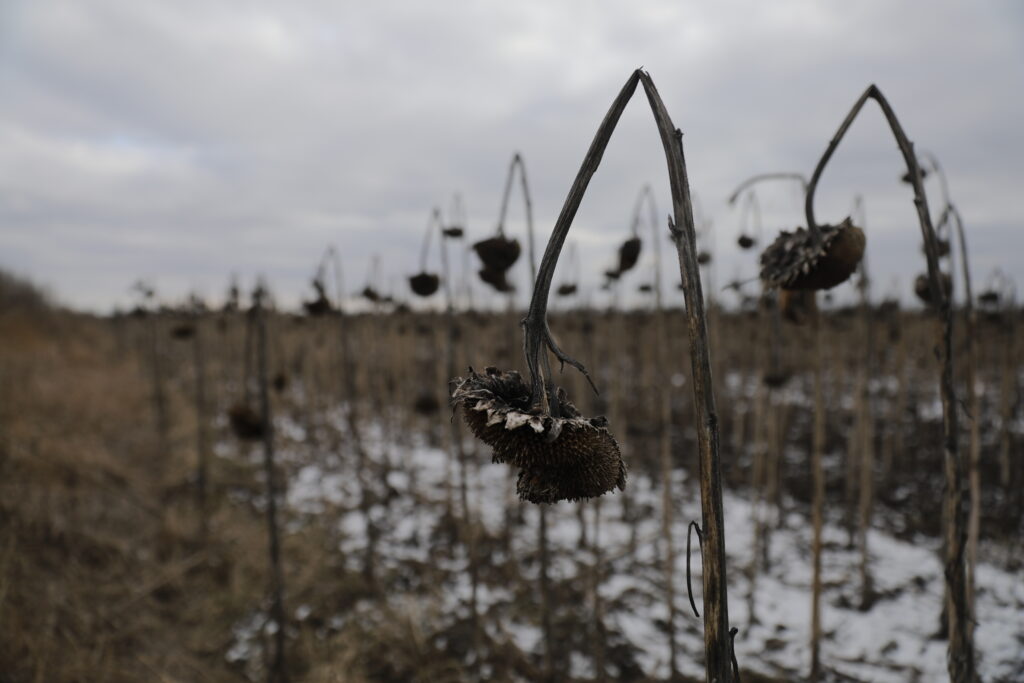
People were intimidated so that they could not do anything
Stores ran out of food in a matter of days. Representatives of the village council, who remained on the ground, tried to help the people. They contacted farmers to provide people with at least minimal needs. Even though most of the villagers had their own stocks, the problem of bread shortage was very acute. But we managed to organize people: some villagers took grain to the mill, others baked bread. There were also people who distributed it to those in needed.
“When we were able to bake the first bread, we were happy,” Yevhen Novikov recalled. “It was probably the brightest thing we managed to do with our own hands. You see, it’s very hard to stay at home and wait. So it was an opportunity to distract from all the horrors that were happening at the front. And in an already occupied place. We didn’t know when we would be liberated and if we would be liberated at all. We actually had no occupation administration. When ‘LPR’ and ‘DPR’ people came, they settled at the border outpost. They stood at checkpoints. They patrolled, checked the documents, and took away whatever they wanted. They came to the school and took away beds, mattresses and kitchenware. They would come with a gun and say, ‘We need this and that.’ They would take it and leave.”
They often got drunk right at checkpoints. One day, drunken militants started shooting and set fire to dry grass. The locals immediately rushed to put out the fire. They really struggled to extinguish it. The militants just stood and laughed. That was how they entertained themselves. One of them drove a tank around the village He ran into someone’s car and crushed it. The local occupation authorities began to form only in the summer. First it was in Kupyansk, then in Velykyi Burluk. The occupiers searched the villages for loyal people and appointed them to leadership positions. By the way, the first appointed leader was blown up. Later, they found another person to replace him.
“What was happening here? They checked documents at checkpoints,” Yevhen Novikov said. “They had some lists with them. We found out that they were looking for ATO participants. They detained a guy who had been in the ATO and kept him for more than a month. He returned in a terrible condition. He told us about brutal beatings, about being put in a bag. He probably spent a week in it. There is a primary school teacher, whose son also served. They visited her and threatened her so that she told them where he was. People were just intimidated.”
The invaders broke into homes and yards, took away cars and household appliances. Sometimes they took away people, too. If any of the locals walked out of the gate during the curfew, they would detain them. And then they made them work for them, for example, clean their territory. They took away their passports. According to Yevhen, people were deliberately intimidated so that they would stay at home and do nothing.
“On May 30, my wife and children left through the Pechenizka dam to the Ukrainiangovernment-controlled territory,” said the director. “It was very dangerous in certain areas. Once a week, the Russians allowed women and children to leave. Men weren’t allowed to leave except for a large bribe. I stayed behind. My eighty-year-old mother wouldn’t go anywhere. I had to stay with her. Plus, there was responsibility. It was the school year, and I had to support people somehow.”
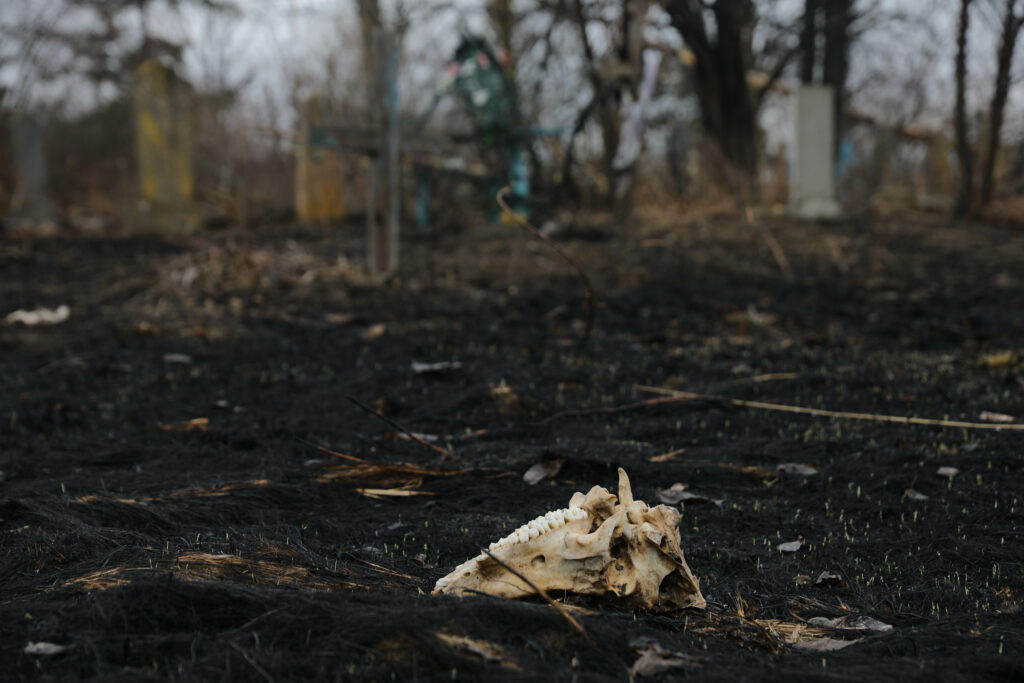
People were afraid to lose their children
The Vilkhuvatka Lyceum resumed classes almost immediately. At first, teachers taught online lessons, and when connection disappeared, they sent homework via parents. In early August, representatives of the occupation administration visited the school. They said that from September 1, everyone would work according to the Russian curriculum.
“I immediately said I wouldn’t cooperate,” Yevhen Novykov recalled. “They proposed another director. Some teachers agreed. No one even voted. “This one will be the director. The rest of you write your resignations.” Most likely, the teachers weren’t aware that it was cooperation.”
On August 6, teachers were given a Russian curriculum. Instead of the Ukrainian language and literature course, there was a course of the language and literature of indigenous peoples. Instead of the history of Ukraine, they started teaching the history of Russia. Yevhen could see those textbooks. According to him, little has changed in them since Soviet times. Only the propaganda of ‘Russian greatness’ has increased. A local history teacher began to teach it. After the liberation, he disappeared somewhere. The physics teacher who agreed to be the director remained. He was detained and even sentenced to a year in prison because of his collaboration with the occupiers.
There were some really absurd situations. One day, a LDPR commander came to ‘inspect’ the school. He was accompanied by security guards and spent 20 minutes in each classroom. No one understood what he was looking for. For example, that commander went into the cooking room and saw flour. And he began checking whether it was drugs. He looked into the chemistry room, saw the reagents and demanded that everything be sealed. Because, he said, “you’ll poison us.” As for the schoolchildren, some of them stayed in the occupied community.
“The following myths were spread: if parents don’t let their children go to school, they’ll be deprived of parental rights,” said Yevhen Novikov, “and will be sent to the Belgorod region. That’s how people were intimidated.”
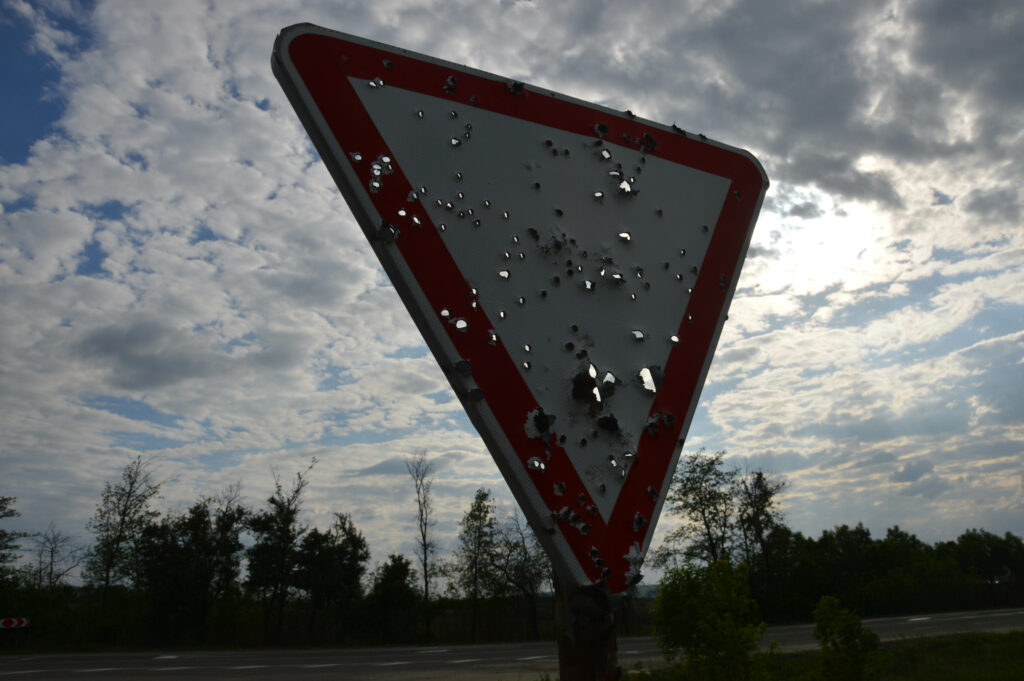
I immediately said I wouldn’t cooperate
On August 28, Yevhen was detained by the occupation police.
“All the staff knew that I had different views,” said Yevhen Novikov, “I didn’t hide anything. They also knew that my wife and children had left. When I stepped down, I kept coming to school. At first, the military police came to me and told me not to go to school. They said I was dissuading teachers from cooperating. Some people didn’t like it. I guess they simply removed me before September 1. Perhaps they thought I would arrange a provocation. They took me away and beat me a little. I spent ten days in a torture chamber in Burluk. And then they took me for interrogation several times.”
The Russians wanted to know if he knew any ATO veterans or was involved in pro-Ukrainian activities. There were people from the so-called DPR and LPR. They had fun making prisoners sing their anthems. And then they bragged about it on social media. Yevhen compares the DPR and LPR members to Russian watchdogs. The Russians treated them as badly as they treated prisoners. For example, they made them provide household services and fulfill all their whims.
The de-occupation of the Kharkiv region began in September 2022. Yevhen Novikov recalled that at first people didn’t understand what was happening. There was cannonade, military vehicles were moving back and forth. On September 10, Yevhen saw that there was no one at the checkpoints.
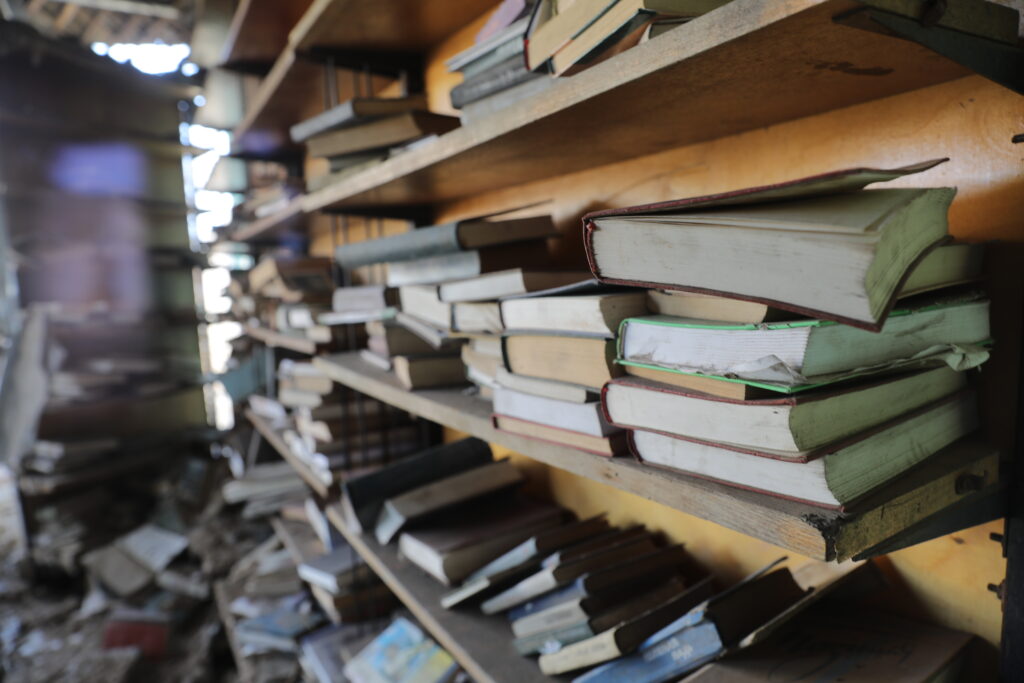
“We didn’t know what was going on,” added Yevhen Novikov. And then, on Sunday morning, my neighbor comes running and shouts: “Zhenia, I saw a tank with a Ukrainian flag on it!”. Then we look and see our guys standing. My neighbor and I approach them. And they are Ukrainian soldiers. There was no fighting here, in fact. The Russians fled and the Ukrainian military came. They immediately stood on the border.”
The principal immediately tried to resume classes at the lyceum. Of course, to the extent possible as a lot of teachers had left the community.
“We were able to gather teachers from only two schools in our community,” said Yevhen Novikov. “I only had the primary school left. We resumed classes only on November 11. But then the worst happened. We were constantly shelled from across the border, not only with the Grads and artillery, which we had already got used to, but also with unmanned aerial vehicles. In fact, we have lost half of our village. The children were forcibly taken away.”
Occupation is an extremely challenging experience. Both for the community itself and for each of its residents. So, no wonder that in such extreme conditions, people show themselves in different ways. Some agree to collaborate with the enemy. Some prefer to hide in order not to expose themselves and their families to danger. And some, like Yevhen Novikov, remains true to himself and committed to his views. And despite all the risks and dangers, he dares to challenge the occupiers. Such stories are inspiring. And it is even more inspiring when it is done by teachers who are raising new generations of Ukrainians.
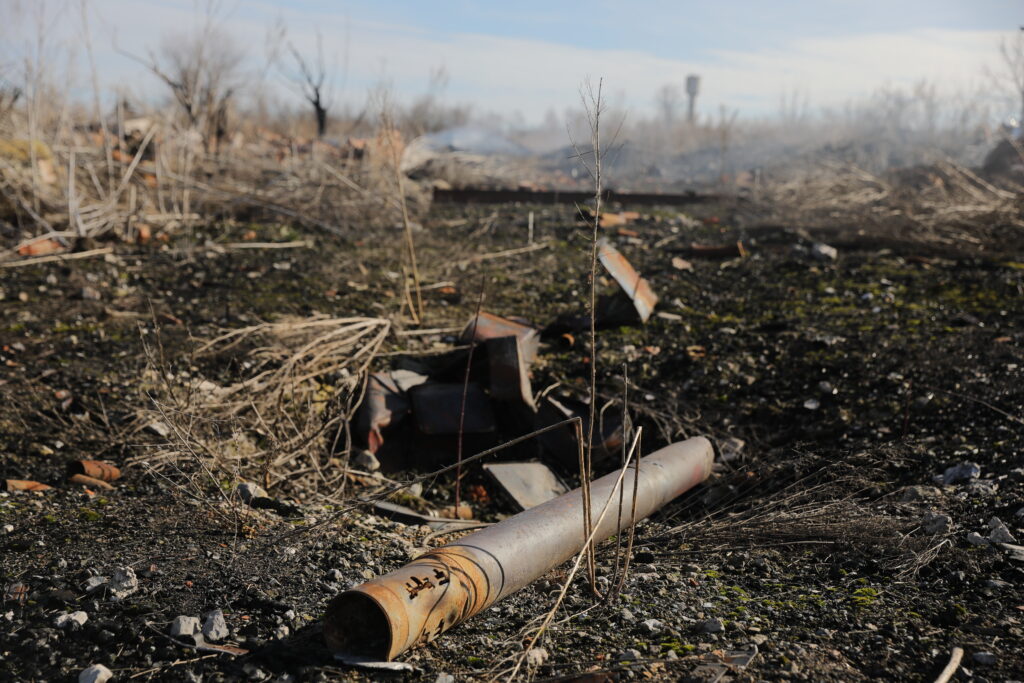
Author: journalist Yulia Hush from Kharkiv
All photos of Julia Hush are illustrative
Carried out as part of the project supported by the US Embassy in Ukraine. The views of the authors do not necessarily coincide with the official position of the U.S. government.

